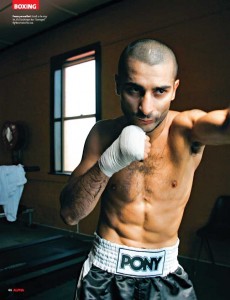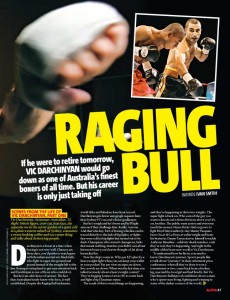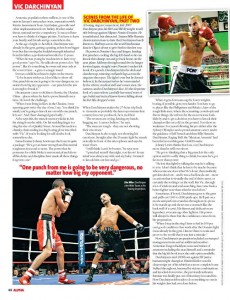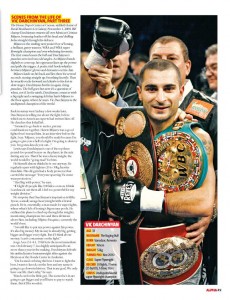 Raging Bull
Raging Bull
A piece about the Armenian-Australian boxer Vic Darchinyan, which I ended up being vaguely pleased with. Like many boxers he offered plenty of good material, being a tough little man with a big punch and a lot of confidence. Utterly unappreciated in his adopted country. Worshipped in the old one. Written for Alpha magazine in 2009.
________
Scenes from the life of Vic Darchinyan, Part One
Vic Darchinyan, Armenian-Australian, 33, slight 166cm figure, crew cut, lean face, sits opposite me in the sunny garden of a quiet café in a plain western suburb of Sydney, consumes a sweet-looking coffee-and-ice-cream thing and talks about destroying people.
Darchinyan is a boxer at a time when boxing is not very well. Chances are, these days, you’d prefer to watch guys with Brazilian martial arts black belts who fight in cages; the ground and pound instead of the straight left to the jaw. Boxing is trying hard to get your attention back and Darchinyan is one of those who could do it.
But he is an odd choice of saviour. The fact that Australians barely know who he is, is well established. Despite the Raging Bull nickname, world titles and fabulous knockout record, Darchinyan gets fewer autograph requests here than Sydney FC’s second-choice goalkeeper.
But he’s tough and he’s brave and he’ll fight anyone if they challenge him. Really. Anyone. And that’s the key. Part of boxing’s decline can be traced directly to the lack of big fights, or fights that were sold as big fights but turned out to be duds. Champions who weren’t champions, belts that meant nothing, matches you didn’t care about between boxers you’d never thought of, let alone barracked for.
 Now the ship’s come in. Why pay $25-plus for a heavyweight fight when you can keep your wallet in your pocket? Pay per view receipts are down, live crowds are down. When was the last time you talked seriously about a heavyweight contest? They’re begging Lennox Lewis (43) to come back and fight a big Ukrainian statue.
Now the ship’s come in. Why pay $25-plus for a heavyweight fight when you can keep your wallet in your pocket? Pay per view receipts are down, live crowds are down. When was the last time you talked seriously about a heavyweight contest? They’re begging Lennox Lewis (43) to come back and fight a big Ukrainian statue.
The result of this is weird things are happening, and they’re happening at the lower weights. The super fight is back on. Who cares if the guy you want to knock out is three divisions above you? It’s on, brother. The public want action and everyone needs the money. Hence Ricky Hatton grows to fight Floyd Mayweather Jr, tiny Manny Pacquaio faces Oscar de La Hoya at welterweight and beats his brains in, Danny Green starves himself to tackle Anthony Mundine – celebrity death matches, only they’re real, they’re happening. And right in the middle of this brave new world is Vic Darchinyan.
To understand how he fits in, you need to know Darchinyan’s journey. Sports people like to talk about “journeys” in their retirement press conferences, when all they’ve done is won a tournament or two, come back from a broken leg, married the local girl and had Brad Jr. But Vic Darchinyan’s bulletproof confidence shows a man who’s spent years living, fighting and winning in some of the darker corners of the world.
________
 Armenia, population three million, is one of the nuts in Europe’s nutcracker: wars, annexation with Russia, harassment from Azerbaijan, genocide and other unpleasantness from Turkey. Borders under threat, national service compulsory. To succeed here you have to think of a bigger picture. You have to leave your family and friends and go somewhere else.
Armenia, population three million, is one of the nuts in Europe’s nutcracker: wars, annexation with Russia, harassment from Azerbaijan, genocide and other unpleasantness from Turkey. Borders under threat, national service compulsory. To succeed here you have to think of a bigger picture. You have to leave your family and friends and go somewhere else.
At the age of eight, so he tells it, Darchinyan was already in the gym, getting a pasting at first from bigger boys but discovering the freakish strength inherited from his father, a professional wrestler for 15 years.
“When he was young he was known to have very good power,” says Vic. He talks about power a lot. “My power”, like it’s something he owns and uses only at the correct time – a gun or a magic wand.
Even as a child he refused to fight on the streets.
“To be honest with you, I don’t like to show off. One punch from me is going to be very dangerous, no matter how big my opponent – one punch in the jaw is enough to break it.”
His amateur career took him to Russia, the Ukraine, China – places where he had to prove himself every time. He loved the challenge.
“When I was living in Kiev, in the Ukraine, I was sparring guys twice the size of me. I say, ‘You think I’m small, you’re going to knock me out with one punch, let’s see.’ And I have damaged guys badly…”
As he says this, the muscle memory kicks in, his fist rising from the table. On his wedding finger is a ring the size of a Quality Street. Around his neck is a chunky chain ending in a big boxing glove inscribed with “Vic”. If you’re looking for self-doubt, look somewhere else.
Famed trainer Johnny Lewis says the boxer is quite a package: “He’s got an inner strength and his mental toughness is second to none. The power that he possesses for a little bloke is astronomical and above all his desire and discipline have made all those things forge into one.”
________
 Scenes from the life of Vic Darchinyan, Part Two
Scenes from the life of Vic Darchinyan, Part Two
A boxing ring in Connecticut, July 2007. Darchinyan puts his IBO and IBF flyweight world title belts up against Filipino Nonito Donaire. He is undefeated, but distracted. Trainer Billy Hussein shouts instructions to him that Darchinyan barely listens to. Halfway across the world his Russian fiancée Olga is about to give birth to his first son.
He paws at Donaire’s face and lunges, landing few punches, cocking the big left-hand so he can knock this chump out and go back home on the next plane. Midway through round five he lunges forward again, straight onto Donaire’s sucker left hook. It’s a peach. Darchinyan hits the deck and clambers up, tottering on Bambi legs across the ring into the ropes. The fight’s over but he doesn’t believe it. In the instant before he’s surrounded by the referee, medical staff and corner men, the camera catches Darchinyan’s face. It’s the desperate look of a man whose carefully harvested store of ego, belief and tactical know-how is falling about his feet like dropped coins.
When Darchinyan makes the 27-hour trip back to Armenia as probably the finest sportsman that country has ever produced, he is mobbed.
“The women are crying, kissing my hands, hugging me. I cannot believe,” he says.
“The men are tough – they are not showing their emotions.”
Darchinyan is also tough, not showing his emotions. Straight after the Donaire fight he stands stoically in front of the microphone and says he wasn’t hurt.
“I still think I can’t be beaten,” he says now.
“I punched myself that night, you know? In my mind was always my wife and my baby. I wanted to knock him out fast and go.”
When it gets down among the lower weights, boxing, if possible, gets even harder. You have to go to places like the Philippines and Mexico, lairs of the tough little men, where the screaming crowds spit and throw things, the referees let the most vicious fouls slide by and to get a decision you have to knock their champion flat out cold on the ground. You show no weakness. For years following his pro debut after the Sydney Olympics and a proud amateur career, under the guidance of Jeff Fenech and then Billy Hussein, Darchinyan, Raging Bull, the “Mexican Assassin” had been the best at this game. Until Donaire.
Johnny Lewis thinks that loss cost Darchinyan more than he will ever show.
“He got to thinking that a big punch is the only option and it’s a silly thing to think, because he’s got far more than power.
“He lost that fight by talking the way he’s talking to you. I don’t think that he has to be macho because when someone does what Vic’s done, then suddenly gets knocked out – and it was a bad knock-out – most occasions that is virtually the end of their career, or certainly the writing’s on the wall. But Vic, through a lot of wisdom and soul-searching, has come back a better fighter now than what he was before.”
Sometimes, if bored, Darchinyan goes to the gym and pulls out 1500 to 2000 push-ups. He’ll put on a movie and perform crunches throughout (to prove it, he stands up and shows me a stomach like the back wall of a cave). His fitness and dedication are legendary, even among other fighters. His power will always be there but the confidence comes from his preparation.
“When I step in the ring I have to feel in 100 per cent good condition. One week after the Donaire fight I was already in the gym. I know I have to train and prove to the world that it was just a mistake.”
Now, Darchinyan’s preparation included a revamped management team and an additional member: Armenian Vazgen Badalyan, seasoned trainer of amateurs including the man himself, and a reminder that the big left hook is not the only option available.
Darchinyan’s mid-2008 bout against IBF junior bantamweight champion Dimitri Kirilov was the clearest sign yet of his rebirth as a more complete boxer. Stalked throughout, harassed by vicious combinations and knocked down twice, the previously unbeaten Russian was finally put out of his misery in round five. Now Darchinyan felt ready to do something no one in his weight class had ever done before.
________
Scenes from the life of Vic Darchinyan, Part Three
The Home Depot Center at Carson, unlikely home of David Beckham’s LA Galaxy, November 1, 2008. IBF champ Darchinyan swarms all over Mexican Cristian Mijares, bouncing leather off his head and drilling holes straight through his defence.
Mijares is the smiling new poster boy of boxing, a brilliant, gutsy warrior, WBA and WBA super flyweight champion and overwhelming favourite. The first round nears the bell and Darchinyan’s punches zero in from odd angles. As Mijares bends slightly to cover up, his opponent lines up the power and pulls the trigger. A perfect left hook whistles between Mijares’ gloves and detonates on his chin.
Mijares lands on his back and lies there for several seconds, staring straight up, breathing heavily. Then he wearily rocks forward and climbs to his feet in slow stages. Darchinyan hurtles in again, firing punches. The bell goes but now it’s a question of when, not if. In the ninth, Darchinyan connects with a big right and a swinging left that hurls Mijares to the floor again, where he stays. Vic Darchinyan is the undisputed champion of the world.
Back in sunny west Sydney a few weeks later, Darchinyan is telling me about the fight, before which most American experts had written him off. He clenches that lethal left.
“I wanted to go back to tactics, put my combinations together. I knew Mijares was a good fighter but I warned him. In an interview before the fight, I say, ‘Mijares, you should be ready because I’m going to give you a hell of a fight. I’m going to destroy you. I’m gonna knock you out…’”
Lewis says Darchinyan is one of the top three pound-for-pound boxers on the planet, in the mix during any era. That if he was a heavyweight, the world would be “going mad” for him.
He himself almost thinks he is one anyway. He regularly spars with fighters 20 to 30kg heavier than him. His old gym had a body protector that carried the message: “Everyone sparring Vic must wear protection.”
“I feel big with power,” he says.
“If I fight 20 people like 100 kilos or more I think I can knock out them all. I feel too powerful for my weight division.”
No surprise that Darchinyan’s inspiration is Mike Tyson, a small, savage heavyweight with a brutal punch. He is, essentially, a man made for super fights, where what’s left of boxing’s big money pools. He outlines his plans to climb up through the weights, mentioning champions two and three divisions above him, including Filipino Pacquiao, currently the world’s best.
“I would like to put my power against his power. It’s also big money. My money is already big, getting bigger and bigger every fight. But if I think about money, I can’t concentrate on the fight.”
Jorge Arce (51-4-1, 39 KOs) is the most immediate test. On February 7, in a highly anticipated bout more than a year in the making, Darchinyan defends his unified junior bantamweight titles against the Mexican at the Honda Center in Anaheim (Ed’s note: Darchinyan won convincingly on a TKO).
“I’m focused on being the best. I want to fight the best, I want to knock out the best and my name is going to go down in history. That is my goal. We only have one life, that’s why,” he says.
Watch out for the little guy. The scenes he’s in are going to get bigger and you’ll have to pay to watch them. But it’ll be worth it.
________
See this as PDFs: